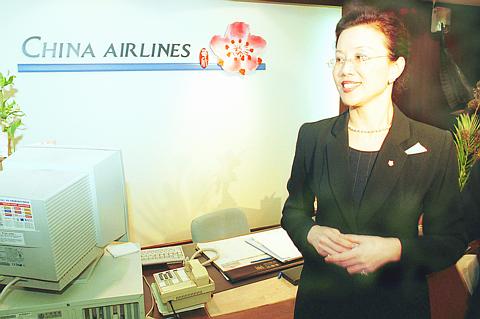China Airlines (CAL,
Lee Yun-ling (
The appointments were made following China Aviation Development Foundation's (CADF, 中華航空事業發展基金會) announcement on Tuesday that a reshuffle would be made. The CADF owns 71 percent of CAL.

PHOTO: CHEN CHENG-CHANG, TAIPEI TIMES.
Voicing opposition to CAL's new management and policies, employees of the state-run airlines yesterday chanted slogans as the old and new corporate brass walked outside to announce the changes.
Chanting "we oppose industry outsiders leading industry professionals" and "we oppose non-transparent management procedures," dozens of CAL employees crowded the lobby of the company's headquarters.
Lee, the new chairman of the board, was a former air force pilot and 23-year veteran of CAL. He joined the company in 1970 as a co-pilot and worked his way up to chief of the flight training center before being transferred to CAL's Far Eastern subsidiary in 1993.
Tsung, 52, has an MBA from the University of Missouri and a 13-year career in the US, including work as the finance director of Powey City near San Diego, California.
Tsung denied media speculation that her nomination -- while lacking any solid aviation industry experience -- was the result of her political affiliation with leaders of the ruling DPP. She defended her qualifications by saying that the "CADF choose me for my solid management and experience in finance."
Commenting at a press conference after the announcement, both of the new leaders addressed the issue on everyone's mind -- safety. CAL has been dogged by safety issues, including an Airbus A300 crash at Taiwan's main international airport two years ago that killed all 203 people on board.
Last August, three people were killed when a China Airlines MD-11 jet flipped upside down and burst into flames at Hong Kong's international airport while attempting to land during a tropical storm.
"I will propose concrete management strategies and measures for improving CAL's safety record one month after I assume this post," Lee said.
Meanwhile, Tsung vowed to "improve the company's unsatisfactory safety record" and make the company an "internationally recognized carrier."
Recent efforts to improve the flight safety standards of the company have included hiring Germany's Lufthansa Technik AG -- a subsidiary of Lufthansa German Airlines -- to train its pilots and engineers in higher safety standards.
Meanwhile, outgoing president, Sandy K.Y. Liu (劉克涯), was appointed chairman of Taiwan Aircargo Terminal Ltd (華儲股份有限公司), a subsidiary of CAL. Former chairman Chiang Hung-I (蔣洪彝) is slated to remain a member of the board, according to company officials.

The US dollar was trading at NT$29.7 at 10am today on the Taipei Foreign Exchange, as the New Taiwan dollar gained NT$1.364 from the previous close last week. The NT dollar continued to rise today, after surging 3.07 percent on Friday. After opening at NT$30.91, the NT dollar gained more than NT$1 in just 15 minutes, briefly passing the NT$30 mark. Before the US Department of the Treasury's semi-annual currency report came out, expectations that the NT dollar would keep rising were already building. The NT dollar on Friday closed at NT$31.064, up by NT$0.953 — a 3.07 percent single-day gain. Today,

‘SHORT TERM’: The local currency would likely remain strong in the near term, driven by anticipated US trade pressure, capital inflows and expectations of a US Fed rate cut The US dollar is expected to fall below NT$30 in the near term, as traders anticipate increased pressure from Washington for Taiwan to allow the New Taiwan dollar to appreciate, Cathay United Bank (國泰世華銀行) chief economist Lin Chi-chao (林啟超) said. Following a sharp drop in the greenback against the NT dollar on Friday, Lin told the Central News Agency that the local currency is likely to remain strong in the short term, driven in part by market psychology surrounding anticipated US policy pressure. On Friday, the US dollar fell NT$0.953, or 3.07 percent, closing at NT$31.064 — its lowest level since Jan.

The New Taiwan dollar and Taiwanese stocks surged on signs that trade tensions between the world’s top two economies might start easing and as US tech earnings boosted the outlook of the nation’s semiconductor exports. The NT dollar strengthened as much as 3.8 percent versus the US dollar to 30.815, the biggest intraday gain since January 2011, closing at NT$31.064. The benchmark TAIEX jumped 2.73 percent to outperform the region’s equity gauges. Outlook for global trade improved after China said it is assessing possible trade talks with the US, providing a boost for the nation’s currency and shares. As the NT dollar

The Financial Supervisory Commission (FSC) yesterday met with some of the nation’s largest insurance companies as a skyrocketing New Taiwan dollar piles pressure on their hundreds of billions of dollars in US bond investments. The commission has asked some life insurance firms, among the biggest Asian holders of US debt, to discuss how the rapidly strengthening NT dollar has impacted their operations, people familiar with the matter said. The meeting took place as the NT dollar jumped as much as 5 percent yesterday, its biggest intraday gain in more than three decades. The local currency surged as exporters rushed to